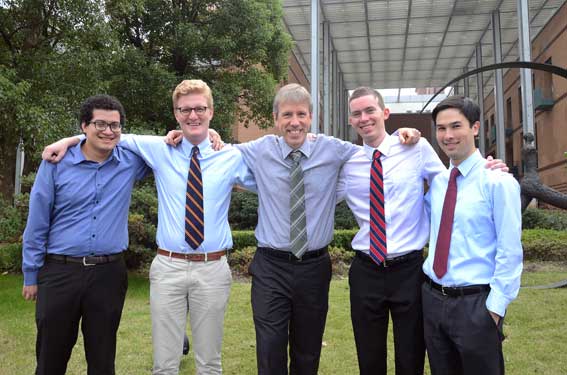
From left: PiA fellows Hugo Polanco and Peter Mihalcik, YK Pao School Secondary Division Executive Principal Paul Wood, PiA fellows Lincoln Plews and Stephen Wong
YK Pao School recently welcomed two new teaching fellows and one returning fellow from the ‘Princeton in Asia’ programme to their Secondary Division for the new academic year. These US graduates will be conducting their fellowships at Pao School in Humanities as well as in teaching and student support areas.
YK Pao School’s partnership with PiA began in 2012 and as of now has eight past and current teaching fellows. The programme was founded when the first Princeton Fellows travelled to China in 1898, and was designed to promote exchange between the US and Asia. Now with over 115 years of history and no longer restricted to Princeton university students, the programme arranges fellowships and internships with host organisations in Asia in various fields, including education, health, international development, environmental advocacy, journalism, engineering, technology, law and business.
Alex Jones, Director of Asia Operations at PiA, currently partners with 15 other institutions, and explained that this collaboration emerged as a result of the dedication of Pao School’s founders to creating a nurturing environment for Pao School students as well as share the school’s unique educational philosophy with the world. ‘YK Pao School is the only primary and secondary school that we partner with in China. The partnership developed because the founders have strong connections to Princeton, and PiA is always looking for excellent schools to send our teachers to and we love what YK Pao School is doing in terms of bilingual education, which is unique, exciting work. It’s a very supportive environment for our fellows and it has been a very healthy partnership so far.’
To become a Princeton fellow at Pao School, in addition to the academic and administrative requirements, applicants must be driven individuals who are dedicated to helping students develop academically as well as working with them both in and out of the classroom. They should also be committed to Pao School’s whole person education mission, fulfilling three important roles: teacher, coach and dorm parent. Peter Mihalcik, Humanities teaching fellow at Pao School, reflected on his first week of orientations at PiA and how they prepared him for his current tenure at the school: ‘During the day, we received vigorous TEFL training and lectures on Asian culture. I gained an immense respect for Chinese culture and felt prepared to take on my teaching responsibilities, and I realized the importance of being a member of a community and cultivating lifelong friendships with people from all over the world. The training I received makes me a better teacher every day. Pao School’s students are constantly teaching me about Chinese culture, and all the while I’ve made incredible bonds with staff and students alike.’
Washington, DC’s Stephen Wong, currently is in his second year of fellowship at Pao School, was impressed by the ambitious mission of the school: ‘My time at the school so far has been wonderful. I enjoy working and living in an international environment that is mission-driven. Through my work with the Junior Secondary Humanities Department, I have learned a great deal from my students who are very curious and excited about learning.’ Hugo Polanco, who hails from Phoenix, Arizona and has studied in Japan, Taiwan, and China before beginning his fellowship at Pao School in 2014, says the experience has not only allowed him to grow as a teacher but also study a new language and develop good relationships with his colleagues.
Pao School Secondary Division Executive Principal Paul Wood also pointed out the many advantages of implementing such a programme at the school: ‘The enthusiasm of these dynamic individuals is infectious and they are a positive influence on our students and our staff! Their language skills can also act as a bridge between our international and Chinese faculty members.’ Speaking on Pao School’s students, Jones had nothing but praise and gratitude for the opportunity given to the school’s current and past PiA fellows: ‘These students are going to lead China, and to be part of their perspective is a great opportunity.’